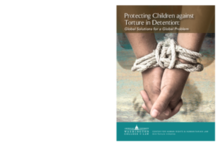This important new article by Eric Rosenthal, Executive Director of Disability International, is published in a new book entited Protecting Children Against Torture in Detention. Rosenthal's article examines the implications of the 2015 report by the Special Rapporteur on torture, Juan Méndez, focused on children deprived of liberty, on the placement of children in institutions and orphanages. In his report, the Special Rapporteur noted the “heightened risk” of violence and abuse as well as the dangers to mental health and development inherent in placing children in institutions. As a result, the Special Rapporteur highighted that deprivation of liberty, which includes the placement of children in institutions, should only be "a last resort" and "for the shortest possible period of time".
In Part I of the article, Rosenthal provides a detailed analysis of the Special Rapporteur's findings and demonstrates that his conclusions are in line with a broader body of international law found in a number of international human instruments, and in authoritative guidance issued by the Committee on the Rights of the Child and the Committee on the Rights of Persons with Disabilities. In Part II, Rosenthal describes the problem of children's institutionalisation globally, its causes and impacts on children, and international efforts to move away from the use institutional care. In Part III, Rosenthal examines the legal foundations for the duty to prevent torture and to promote community integration under Convention against Torture and the Convention on the Rights of Persons with Disability. Part IV examines the standard for detention or placement of children established by UN Special Rapporteur on Torture, Juan Méndez. In Part V, Rosenthal describes how the protection against torture or ill-treatment can and must be enforced to protect children subject to detention in institutions. Finally, in Part VI of this article, Rosenthal draws from the previous analyses to argue that the duty of governments and donors to prevent segregation and torture create a mandate and an obligation to end the placement of children in institutions.
The article highlights the importance of understanding the application of a human rights framework to children's care, and in particular to the use of institutional care. Rosenthal concludes, "the implications of the Méndez Report are powerful: governments are subjecting children to an unjustifiable risk of ill-treatment or torture until such time as they eliminate institutions. International donors or charities that support institutions or orphanage placement are perpetuating this problem. The protection against torture creates new avenues for legal enforcement, as well as redress and reparations for victims. Governments are obliged to redress abuses through actions that will support return to a family and reintegration into society. The Méndez Report provides guidance to governments and international development agencies on ways to address the urgent concerns of millions of children who are now detained in institutions—or who are at risk of such detention."

